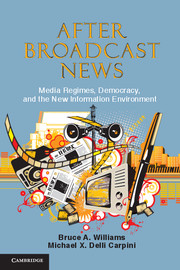Book contents
- Frontmatter
- Contents
- Acknowledgments
- 1 Is There a Difference Between Tina Fey and Katie Couric? Policing the Boundaries Between News and Entertainment
- 2 Media Regimes and American Democracy
- 3 And That's the Way It (Was)
- 4 Political Reality, Political Power, and Political Relevance in the Changing Media Environment
- 5 Politics in the Emerging New Media Age
- 6 When the Media Really Matter
- 7 9/11 and Its Aftermath
- 8 Shaping a New Media Regime
- References
- Index
- References
6 - When the Media Really Matter
Coverage of the Environment in a Changing Media Environment
Published online by Cambridge University Press: 05 June 2012
- Frontmatter
- Contents
- Acknowledgments
- 1 Is There a Difference Between Tina Fey and Katie Couric? Policing the Boundaries Between News and Entertainment
- 2 Media Regimes and American Democracy
- 3 And That's the Way It (Was)
- 4 Political Reality, Political Power, and Political Relevance in the Changing Media Environment
- 5 Politics in the Emerging New Media Age
- 6 When the Media Really Matter
- 7 9/11 and Its Aftermath
- 8 Shaping a New Media Regime
- References
- Index
- References
Summary
To me the question of the environment is more ominous than that of peace and war.…I’m more worried about global warming than I am of any major military conflict.
– U.N. Weapons Inspector Hans Blix, March 14, 2003Through “balanced” coverage, the mass media have misrepresented the scientific consensus of humans’ contribution to global warming as highly divisive.…Such coverage has served as a veritable oxygen supply for skeptics in both the scientific and political realms.
– Boykoff and Boykoff (, 134)This is a movement about change, as individuals, as a country, and as a global community. Join the 935,104 supporters of the Stop Global Warming Virtual March, and become part of the movement to demand our leaders freeze and reduce carbon dioxide emissions now.
– StopGlobalWarming.org, 2004In May 2004, The Day after Tomorrow, a $125 million Hollywood blockbuster (with a $50 million advertising budget) opened in American theaters. Directed by Roland Emmerich (The Patriot, Godzilla, Independence Day), the movie told the story of a sudden ice age brought on by the collapse of ocean currents caused by global warming. The elaborate special effects depicted the destruction of New York City and Los Angeles by killer hurricanes and giant tidal waves. As is typical for many summer blockbusters, the film opened to decidedly mixed reviews but did well at the box office, grossing $187 million during its American theater run. Yet the movie was more than a mindless summer distraction, it was also a political text that initiated a fresh round of public dialogue, albeit brief, about global warming. Coming just a few months before the 2004 presidential election, the film's portrayal of a disengaged president, a venal and powerful vice president, and an administration in denial about global warming was seized on by both environmentalists and climate-change skeptics. The controversy over the movie and the actual threat of global warming became the subject of an intense flurry of newspaper coverage, which moved across the arts and entertainment, science, news, and op-ed sections. So, using the definition of politically relevant media that we suggested in , The Day after Tomorrow played a role in shaping opportunities for understanding, deliberating, and acting on (1) the conditions of one's everyday life, (2) the life of fellow community members, and (3) the norms and structures of power that shape those relationships. We also hasten to add that The Day after Tomorrow was by no means the first feature film to play such a role in coverage of the environment. The China Syndrome (1979, directed by James Bridges), a story about an accident at a nuclear reactor starring Jane Fonda and Jack Lemmon, was the subject of a similar debate, which was cut short, ironically, when the accident at Three Mile Island occurred twelve days after the movie's release.
- Type
- Chapter
- Information
- After Broadcast NewsMedia Regimes, Democracy, and the New Information Environment, pp. 168 - 221Publisher: Cambridge University PressPrint publication year: 2011



